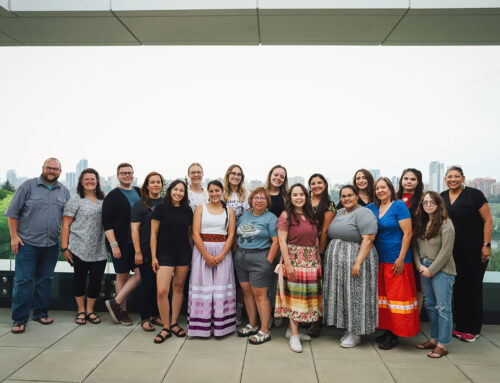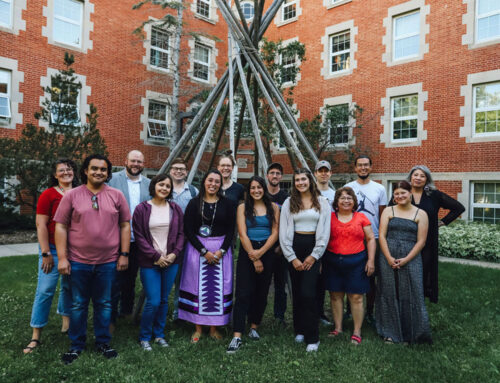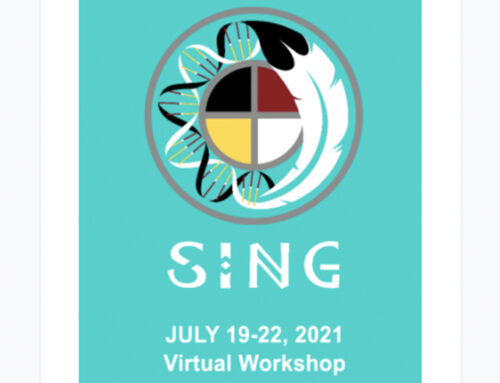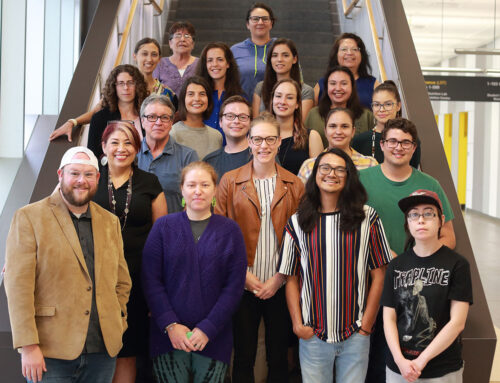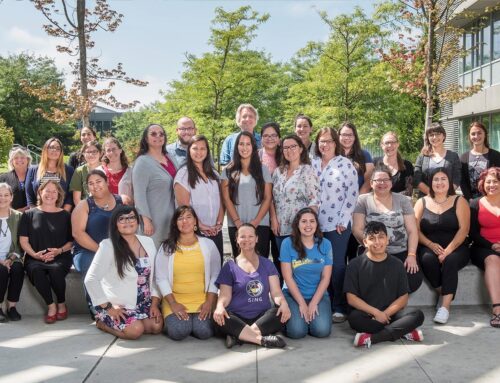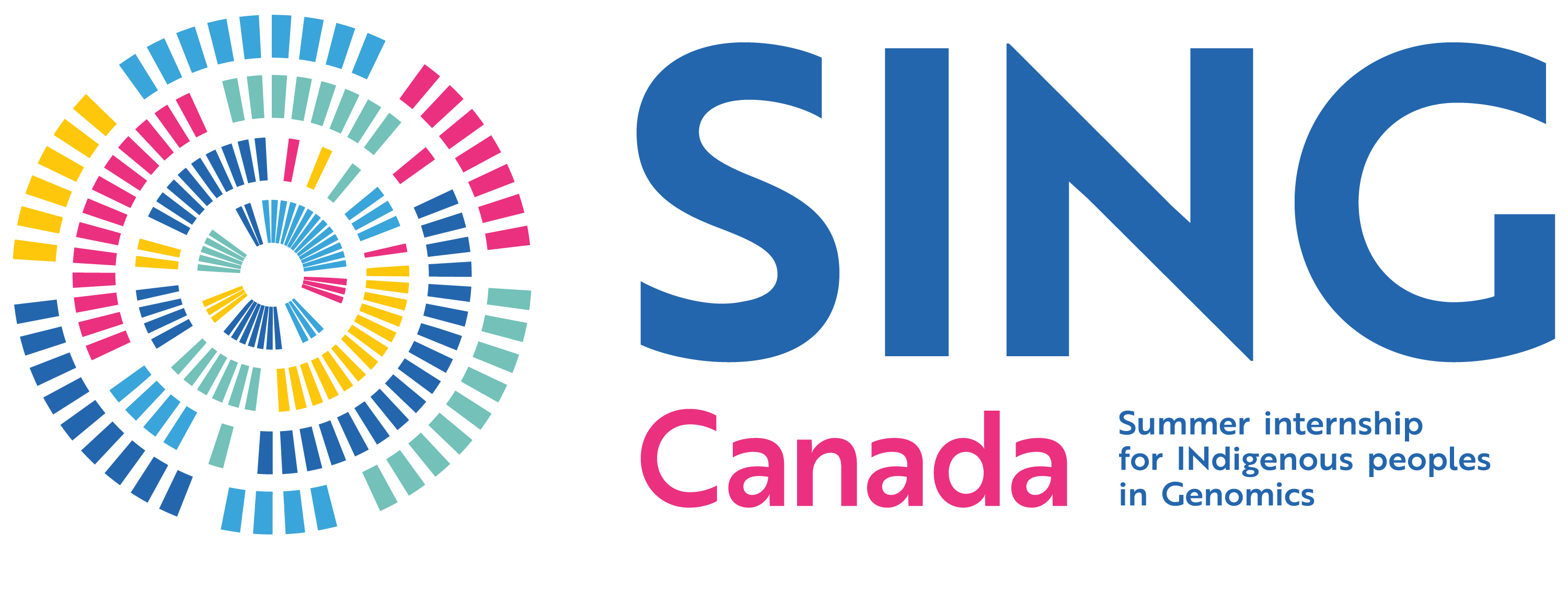2024 Global Indigenous Leadership in Genomics Symposium (GILGS’24)
From May 5th to 9th, 2024, over 140 scholars, students, allies, and supporters (including funders) met on the unceded lands of the Musqueam Nation at the University of British Columbia (UBC) in Vancouver to discuss the present and future of Indigenous genomics research globally.
The event was hosted by SING Canada and supported by members of the global SING Consortium (SING US, Aotearoa, Australia and Mexico). The agenda was structured around three connected activities—the first part of the week (May 6-7) focused on SING Alumni, with alumni networking activities, presentations, and professional development activities. The second component of the symposium (May 8-9) was a plenary-style format spread over 2 days, including several keynote talks. The final component (May 10) was a workshop/forum that included SING Consortium members and potential member organizations.
Background
The SING Consortium is the collective leading voice in Indigenous-led genomics, bioinformatics, data sovereignty, and decolonial/Indigenous ethics globally. A priority for the SING Consortium is to host global summits intended to bring SING alumni, faculty, and staff together to present research and strengthen relationships. The first SING global summit was held in January 2020 in Aotearoa/New Zealand, and was hosted by SING Aotearoa. With broad support from the Consortium, SING Canada was identified to organize and host the next SING Global meeting.
Preliminary planning for this event began in January 2023. The organizing committee was composed of the local SING Canada organizing team and a Global Steering Committee of representatives from each Consortium member.
Acknowledgements and Linkages
This symposium would not have been possible without the generous support of our long-term funders/supporters: Genome Canada, Genome Alberta and the University of Alberta (UofA)’s Faculty of Native Studies.
We are also thankful to SING Consortium partners who secured funding for the travel and participation of SING faculty. In addition, we received support funds from the Henry Luce Foundation, the Social Sciences and Humanities Research Council (SSHRC) Connections grant program, UBC’s Department of Forestry, UofA’s SKIPP program, a private donor, and the Ărramăt Project: Biodiversity Conservation and the Health and Well-being of Indigenous Peoples.
The Ărramăt Project is an important partner in this event. The project, funded by Canada’s New Frontiers Research Fund, is hosted at the University of Alberta and brings together more than 150 Indigenous organizations and governments from around the world. The project’s focus is to strengthen Indigenous voices and capacities to document knowledge about the importance of the whole environment (including biodiversity) to the health and well-being of Indigenous communities. One of the ten pathway teams for Ărramăt is “Decolonizing Science and Education” and is led by SING faculty Kim TallBear and Warren Cardinal-McTeague, alongside May-Britt Ohman (who is initiating SING Sabme). This theme was discussed at GILGS through three concurrent sessions with presentations by eight Arramat project partners.
Perhaps most importantly, we want to recognize the tremendous support of the UofA and UBC staff and volunteers who helped us on-site with note-taking, signage, registration, clean up and people management.
GILGS participants enjoy the views and engage in discussion at Spanish Banks. Photo credit: Tracy Howlett
GILGS at a Glance
- GILGS was attended by 50 alumni from Canada, Mexico, the United States, Aotearoa, and Australia.
- 16 SING Faculty joined us in Vancouver, alongside 3 faculty who joined remotely from Sweden, Chile, and New Zealand.
- Attended in person by 58 general registrants and 22 special guests for a total of 146.
- Approximately 25 different Indigenous groups were represented at GILGS.
- GILGS had 10 sessions featuring 30 talks from over 30 speakers.
- Themes of the conference included: Governance and Indigenous genomics, Indigenous approaches to scientific and genomic research, Indigenizing health policy, Indigenous data, decolonizing science and genomics, and using art as an approach to conceptualizing genomics and science. Over 10 topics were covered during the conference!
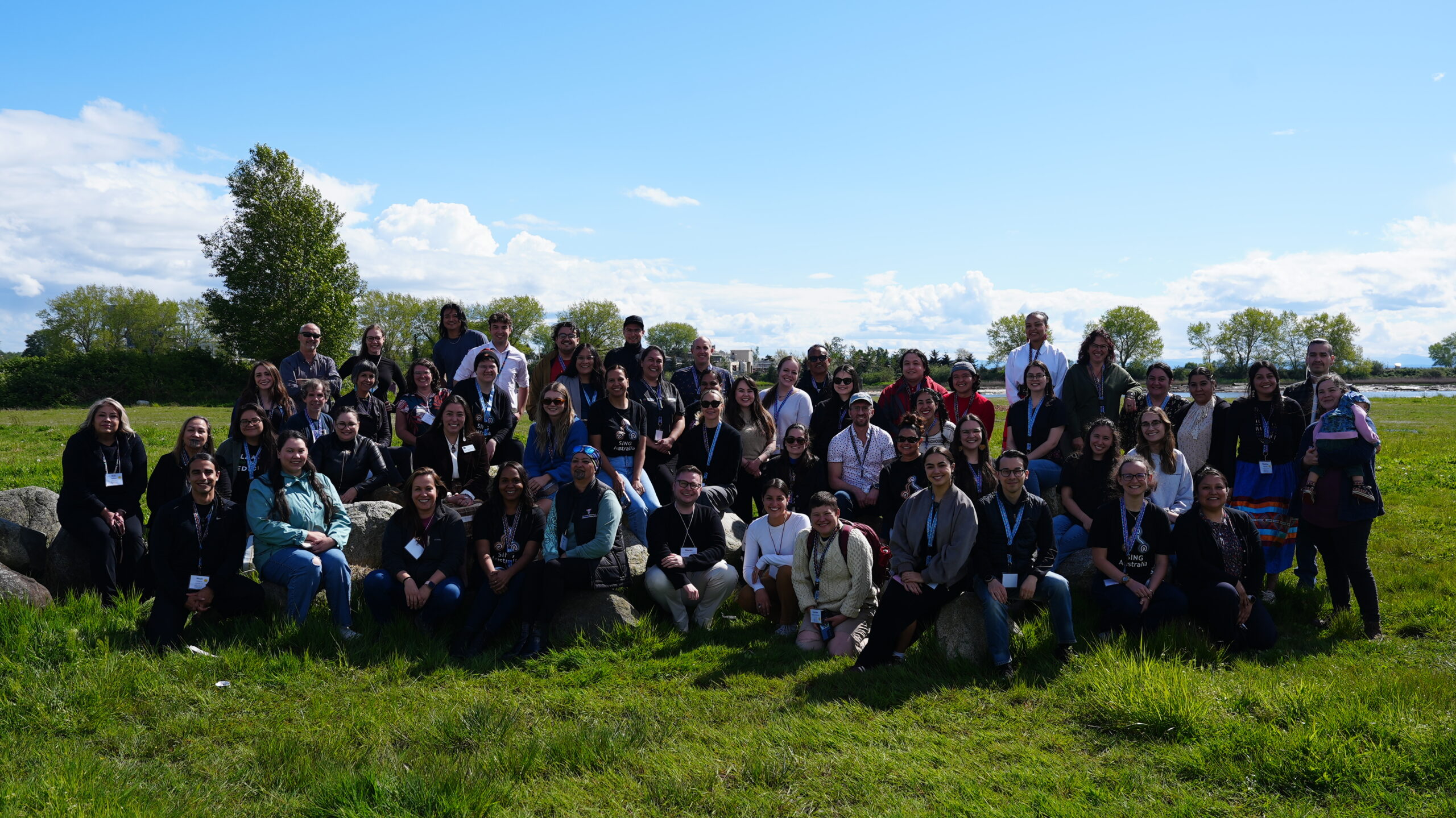
SING alumni pre-conference workshop participants at Musqueam First Nation. Photo Credit: Peter Kolopenuk
Highlights
- Opportunities to connect with other alumni, researchers, community members, and allies from around the world.
- Exercising welcome protocols following Musqueam governance with Elder Larry Grant at the Musqueam Community Centre.
- Relationship-building session on Musqueam Nation Lands, which allowed alumni to connect with faculty surrounded by nature.
- Keynote addresses by Dr. Zoe Todd (Simon Fraser University) and Dr. Evan Adams (First Nations Health Authority).
- Multiple opportunities for participants to connect with the local environment: An incredible day spent on Musqueam Nation lands on the banks of the Fraser River, followed by a visit to Spanish Banks Beach (one of the most famous beaches in Vancouver!)
- Panels and lectures led by Indigenous researchers, alumni, community members, and other leaders throughout the four-day alumni gathering and symposium.
- Over 25 alumni presented their current research focuses and/or areas of work that they plan to conduct research on.
- Lots and lots (and lots) of great food, including at our gala event, where we were treated to a traditional Musqueam Feast with fresh Pacific salmon by Salishan Catering.

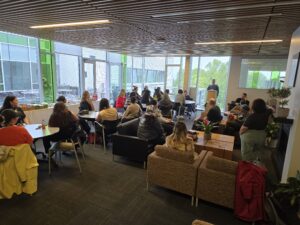 Beginning at the University of British Columbia, alumni joined for a welcome dinner and kick-off event. Both Warren Cardinal-
Beginning at the University of British Columbia, alumni joined for a welcome dinner and kick-off event. Both Warren Cardinal-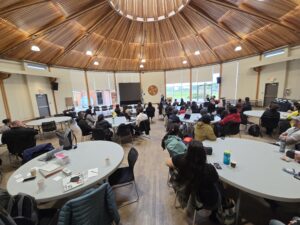 The first day of the Alumni Workshop took place at Musqueam Nation lands in the
The first day of the Alumni Workshop took place at Musqueam Nation lands in the 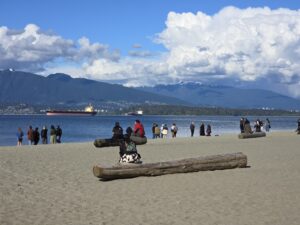 The afternoon featured fifteen presentations from alumni about their journeys and their research. Presentations covered a wide range of topics but included work on kinship, capacity building, eDNA, and Indigenous knowledge (pictured at left).
The afternoon featured fifteen presentations from alumni about their journeys and their research. Presentations covered a wide range of topics but included work on kinship, capacity building, eDNA, and Indigenous knowledge (pictured at left).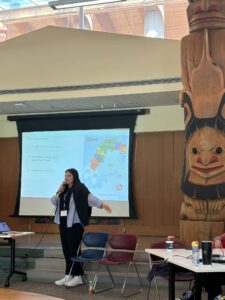 The morning of day two was spent at the UBC Longhouse. Led by Huti Watson (General Manager of Te Waha o Rūaumoko – Centre of Excellence, Ngati Porou Oranga, and SING alum), alumni and faculty engaged in a visioning session where participants discussed the values, individual reflections, and the future of the SING Consortium culminating in the creation of vision boards. Alumni highlighted the importance of intergenerational thinking, reciprocity, and relationality. It was a wonderful opportunity to share experiences and the vision for future SING gatherings. A group of students will be working to draft a broader statement post-symposium.
The morning of day two was spent at the UBC Longhouse. Led by Huti Watson (General Manager of Te Waha o Rūaumoko – Centre of Excellence, Ngati Porou Oranga, and SING alum), alumni and faculty engaged in a visioning session where participants discussed the values, individual reflections, and the future of the SING Consortium culminating in the creation of vision boards. Alumni highlighted the importance of intergenerational thinking, reciprocity, and relationality. It was a wonderful opportunity to share experiences and the vision for future SING gatherings. A group of students will be working to draft a broader statement post-symposium. 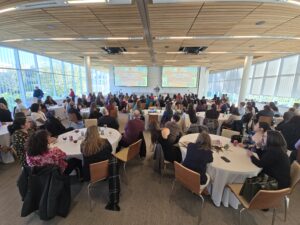 In the evening, we held our Welcome Feast for GILGS. We welcomed attendees, alumni, faculty, and friends of the SING Consortium (pictured below). Our night featured a traditional Musqueam Feast by Salishan Catering, a Silent Auction hosted by Laurie Montour, and an incredible keynote speech by Dr. Evan Adams of the First Nations Health Authority, leaders of Indigenous health governance. We were also lucky to be joined by Tsatsu Stalqayu (Coastal Wolf Pack), whose cultural performance concluded our Welcome Feast!
In the evening, we held our Welcome Feast for GILGS. We welcomed attendees, alumni, faculty, and friends of the SING Consortium (pictured below). Our night featured a traditional Musqueam Feast by Salishan Catering, a Silent Auction hosted by Laurie Montour, and an incredible keynote speech by Dr. Evan Adams of the First Nations Health Authority, leaders of Indigenous health governance. We were also lucky to be joined by Tsatsu Stalqayu (Coastal Wolf Pack), whose cultural performance concluded our Welcome Feast! 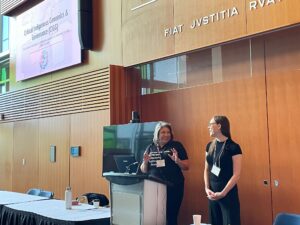 The first day of the symposium began with an opening keynote on Critical Indigenous Genomics and Governance, delivered by Kim TallBear and Jessica Kolopenuk (pictured at left), followed by a roundtable discussion on Indigenous leadership in genomics featuring the stories of the SING Consortium members. We were fortunate to have representatives from the United States, Mexico, Australia, Aotearoa, and Micronesia join us to share more about their programs! Attendees heard about the diversity of approaches and experiences from faculty. The afternoon was followed by concurrent sessions, which discussed topics such as Indigenous health research and Indigenous governance of the natural world. The day culminated with a keynote panel on medical genetics and Indigenous health equity, moderated by Jessica Kolopenuk and Rick Smith.
The first day of the symposium began with an opening keynote on Critical Indigenous Genomics and Governance, delivered by Kim TallBear and Jessica Kolopenuk (pictured at left), followed by a roundtable discussion on Indigenous leadership in genomics featuring the stories of the SING Consortium members. We were fortunate to have representatives from the United States, Mexico, Australia, Aotearoa, and Micronesia join us to share more about their programs! Attendees heard about the diversity of approaches and experiences from faculty. The afternoon was followed by concurrent sessions, which discussed topics such as Indigenous health research and Indigenous governance of the natural world. The day culminated with a keynote panel on medical genetics and Indigenous health equity, moderated by Jessica Kolopenuk and Rick Smith.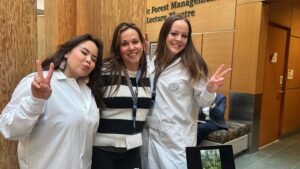 Day one concluded with a poster session and networking reception held in the UBC Faculty of Forestry Atrium. Alumni posters focused on a wide range of topics in Indigenous environmental and health genomics and the social/ethical/legal considerations of genomics. The evening also featured SING Canada’s mobile DNA lab and a demonstration of MinION portable sequencing technology that allows research to be reoriented within Indigenous communities. The SING Canada lab team, Chantel Akinneah (SING ‘23), Betsy Nelson (Faculty) and Mackenzie Burnstick (SING ‘23) is pictured.
Day one concluded with a poster session and networking reception held in the UBC Faculty of Forestry Atrium. Alumni posters focused on a wide range of topics in Indigenous environmental and health genomics and the social/ethical/legal considerations of genomics. The evening also featured SING Canada’s mobile DNA lab and a demonstration of MinION portable sequencing technology that allows research to be reoriented within Indigenous communities. The SING Canada lab team, Chantel Akinneah (SING ‘23), Betsy Nelson (Faculty) and Mackenzie Burnstick (SING ‘23) is pictured. 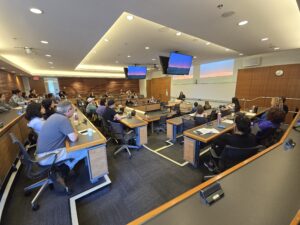 To conclude the Conference, we had a full day of panel presentations and discussions on a variety of topics. In the first concurrent session, attendees had the opportunity to attend a panel presentation on overcoming structural barriers in STEM or a panel on the Arramat project. The second session featured two concurrent panels on decolonizing genomic strategy and relationship building in scientific research, respectively. The latter included a presentation by Warren Cardinal-McTeague and James Knibb-Lamouche on the relationship between SING Canada and kihcihkaw askî.
To conclude the Conference, we had a full day of panel presentations and discussions on a variety of topics. In the first concurrent session, attendees had the opportunity to attend a panel presentation on overcoming structural barriers in STEM or a panel on the Arramat project. The second session featured two concurrent panels on decolonizing genomic strategy and relationship building in scientific research, respectively. The latter included a presentation by Warren Cardinal-McTeague and James Knibb-Lamouche on the relationship between SING Canada and kihcihkaw askî.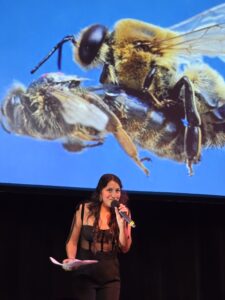 At the end of the week, we collaborated with
At the end of the week, we collaborated with 